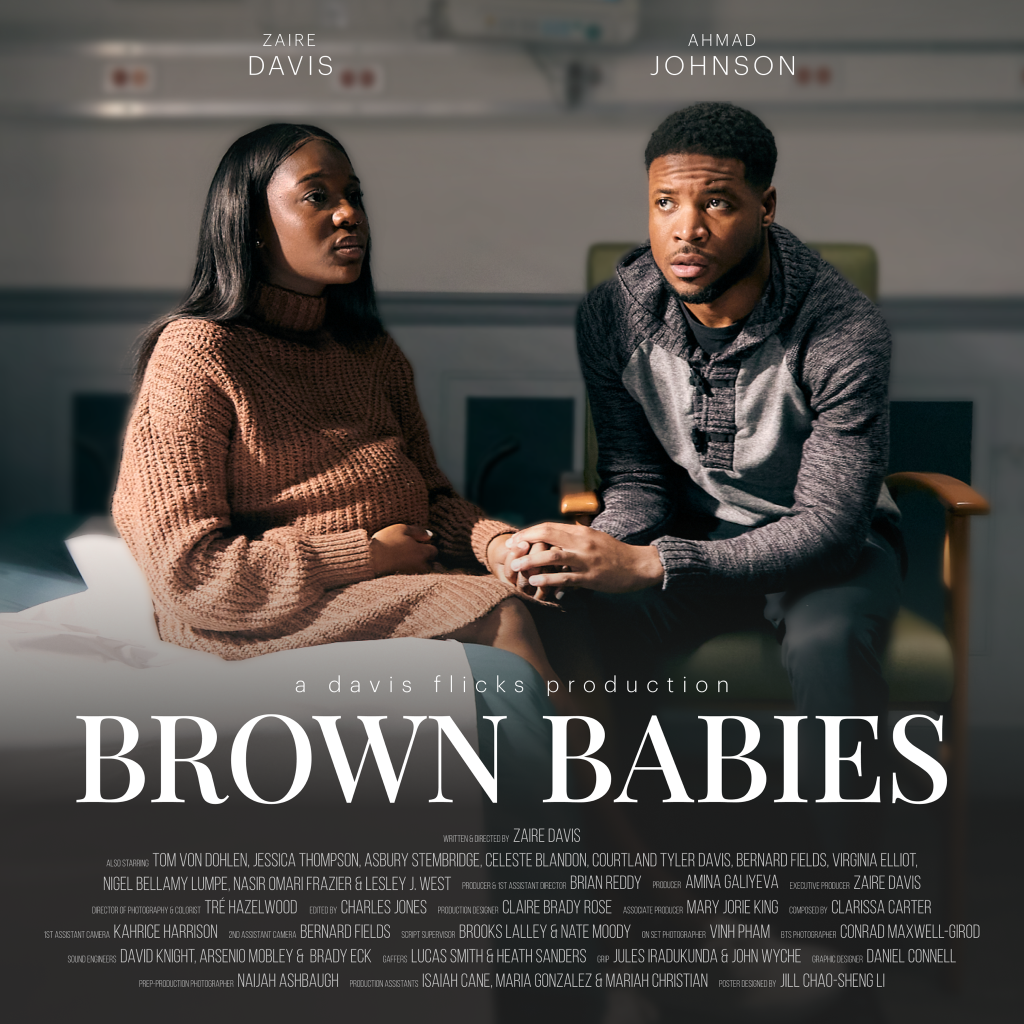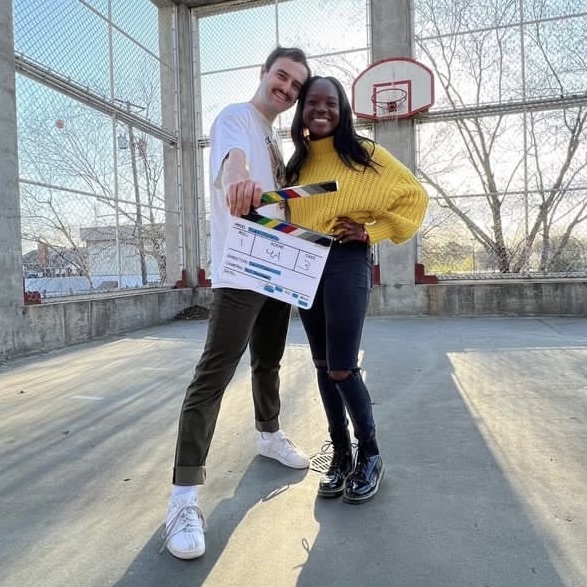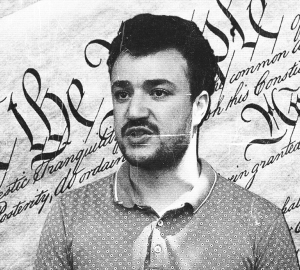The team behind Davis Flicks sends a powerful message on healthcare racism with new film, “Brown Babies”
SCAD film and television alum Zaire Davis and her team at Davis Flicks have officially finished post-production for “Brown Babies,” a project near and dear to Davis’s heart. It’s a powerful film that follows a black man’s experience of losing his young fiancée to a racist healthcare system — through a mistake that doctors could have prevented — as he struggles to raise his newborn twins on his own.
Not only did Davis write and direct the film, an impressive feat in and of itself, but she stars in “Brown Babies” as well. She plays the role of Asia, a soon-to-be-married expectant mother.
“With each project that I create, I always write myself a character to play,” says Davis. “And I’ve always felt like I had great people around me to be able to help navigate that on set.”

The official poster for “Brown Babies.” Image courtesy of Zaire Davis.
One of those people is none other than Brooks Lalley, a SCAD senior majoring in film and television production. “I think there are probably only two or three people in my life — if I’m going to do a film — like, I need this person here,” says Davis. “And Brooks [Lalley] is one of those people.”
“I met Zaire at an acting class in Atlanta before I even came to SCAD,” shares Lalley. The two of them hit it off and became fast friends. “And really, since then, any time she has a project, I’m always involved in some capacity.”
“Brooks is probably the one person in my life — ever since I’ve met him — he’s stayed through every project from start to finish,” says Davis. “He has always taken the time to just be a part of anything I do.”
Davis and Lalley worked together on Davis’s first project, “Pinky Promise,” back in 2021. Lalley also edited her thesis film, “Lost Time,” which was selected as a semi-finalist for the 2023 Flickers’ Rhode Island International Film Festival. “Brown Babies” is now the third film that Davis and Lalley have created together.
“Zaire is one of the hardest working people that I know, because she’s driven by her vision,” Lalley says. “Working with her… she’s powerful. She speaks with authority. She knows what she wants on set. And she knows the recipe it takes to bring together a project. But she’s never condescending. She’s always collaborative. And that is so rare, to be able to do all the things she does with excellence and class. The passion that she has rubs off on anybody that’s around her.”
“I appreciate Brooks because he’s honest, and I respect his opinion,” Davis says. “He’s someone that I trust enough to give me honest feedback during the filmmaking process, and he’s someone that’s willing to try new things.”
“Not even just with ‘Brown Babies,’” Davis adds. “I wrote something last week, and I asked him to read it, and he got back to me in a day with a long list of notes. He’s someone I can count on.”
Davis recognizes that she’s fortunate to have a friend and a teammate as loyal as Lalley. “You can be friends with somebody and have a good time, but I think it takes a lot to be able to trust somebody and respect their opinions,” she says. “And it really means something — you know, because everybody says they want to help, but there’s not a lot of people that stay until the end. And Brooks is that person that stays until the end.”

Lalley and Davis pose for a photo together while filming “Lost Time.” Photo courtesy of Brooks Lalley.
Lalley says that he enjoys working with Davis because they both share a “big picture” vision when it comes to filmmaking. Typically, he’s more on the producing side when it comes to lending a hand with Davis Flicks. But this time, for “Brown Babies,” he was in charge of script supervising.
“Zaire wrote [“Brown Babies”] during her last year of her M.A. program at SCAD, and she held onto it,” Lalley explains. “Because I think she knew it was one of the scripts she was most proud of. So, she kept it close until she was truly ready to make this film.”
Davis wrote the first version of the “Brown Babies” script about three years ago. “It was originally around 26 pages,” says Davis. “And then the shooting script, I got it down to 10 pages… and it was the 11th version of the draft.”
After two years of reworking that script, Davis and her team started fundraising last November, and shot the film in March.
“It’s been a long time coming,” says Lalley. “‘Brown Babies’ is a concept and a story that she’s been developing for a while, and this is the story that Zaire is really passionate about telling. We’re all very excited about this project.”

Ahmad Johnson as Zay in “Brown Babies.” Photo courtesy of Zaire Davis.
When asked what pushed her to create this film, Davis explains that a history of breast cancer runs in her family. “Growing up, I was always encouraged to check for lumps and bumps about once a month,” she says. “One time, I felt a bump — and I didn’t think it was anything serious — but I just went to urgent care anyway.”
She says that she waited an hour for someone to put her in an exam room, but she was quickly dismissed by her doctor.
“When the doctor finally came in, she wasn’t really paying attention to me,” says Davis. “She asked me a couple questions, and then she left. Then, a nurse came back and said I told me I was discharged — but I hadn’t even taken off my shirt.”
Later, in the car, Davis called one of her sorority sisters from undergrad at Delaware State University, venting to her about the situation. She was shocked when she heard laughter on the other end of the phone call.
“She told me, ‘Zaire, you know we have to go to black female doctors to be taken seriously. Everyone knows that.’”
Unfortunately, Davis’s sorority sister is right. This is the reality for black women in America, especially when it comes to maternal healthcare. According to the Centers for Disease Control and Prevention, black women are three times more likely than white women to die while giving birth. And those mortality rates are even higher among black mothers in the south.
“The way she said it made me realize that this was something that was normalized, that this is just the expectation,” continues Davis. “That’s how ‘Brown Babies’ developed. I wanted to write something where people could understand and recognize this reality, and they could ask themselves, ‘Why aren’t we doing anything about it?’”
“A common theme with any of Zaire’s films is that it’s going to challenge the audience to really empathize with the characters and understand how the narrative relates to the modern day,” says Lalley. “I think this film is going to challenge viewers to really understand what racism looks like, in a way that they wouldn’t immediately be able to identify. The problems in those deep parts of our culture are definitely reflected in ‘Brown Babies.’ And it’s done in Zaire’s very intimate and intentional way.”
Davis shares that The Massachusetts Health and Hospital Association in Boston has reached out to her team about doing a screening of “Brown Babies” in the near future. “I’m hoping that through this film, we can collaborate with Black maternal health experts and spread more awareness on the topic,” she says.
The film’s next screening is being held in Los Angeles this spring. “Brown Babies” is partnering with Cinnamoms in April 2024 for Black Maternal Health Week. “After the holidays, we’ll get ‘Brown Babies’ into some film festivals, so there will be more screenings for everybody outside of L.A. to enjoy,” says Davis.
When asked what it was like wearing so many hats for this project, Davis clarifies that it wasn’t easy, but that it was all worth it in the end.
“I took acting classes with a private coach to work on this character leading up to the film, so I felt really good as far as acting,” says Davis. “But what was really hard was directing and producing on set, as well as being a few time zones away when I wasn’t on set.”
Davis currently resides in Los Angeles, but “Brown Babies” was shot in Atlanta. “The casting crew is in Atlanta, the locations are in Atlanta, and I think I really underestimated the difficulty of working a full-time job and not being on the same time zone as my team,” Davis says.
“It’s so impressive to watch her work,” adds Lalley. “It’s like watching somebody juggle while walking on a tightrope — the way that Zaire is able to wear all the hats and fulfill all the roles to move the vision forward for this project.”
There is one on-set example that sticks out to Lalley. “I’ll never forget sitting in the studio, where we were shooting the hospital scene, and just watching [Davis] go from producer mode to director mode to actor mode, in the span of about two minutes,” he recalls with a laugh. “I’ll never forget seeing her in a fake pregnant belly — directing, producing, and then jumping on set, ready to go when the cameras were rolling. It was incredible.”
Lalley says that his favorite part of creating “Brown Babies” was watching Davis get excited over the visuals on the monitor when filming. “We were at the bar, shooting a scene, and there’s this beautiful lighting. And [Davis] just squeals and gets so giddy every time she looks on the monitor and sees something that Trey [Hazelwood] — her director of photography on this project — put together.”
“In those moments where Zaire gets excited, it’s like seeing a little kid in a candy store, seeing their dreams come true in real time,” he says.

Courtland Davis as Dre in “Brown Babies.” Photo courtesy of Zaire Davis.
When asked what aspects of her success she’s most proud of, it’s clear that Davis’s dreams are coming true. “I think I’m most proud of the fact that I just always tried to work hard and didn’t settle. And I think so far, it’s paying off.”
“I’ve been working at Disney for two years now,” Davis says. “I was a remote intern while I was getting my master’s at SCAD. It was supposed to be three months, and then they extended me for a year.”
Davis attended all her SCAD classes in the morning while interning. By noon, she’d be ready to log on to meetings with her team at Disney, who was operating at 9 a.m. PST in Los Angeles, California.
Shortly after graduating from SCAD with her M.A. in film and television production, Davis learned about a job opportunity as a production assistant with “The Proud Family: Louder and Prouder.”
“I love that show, so I applied,” she says. “And I had an interview, but I didn’t get it.”
Although she was discouraged, Davis reached back out to Disney for constructive criticism. It was a decision that ended up playing a vital role in her hiring process.
“I asked if they could give me feedback on why I didn’t get the job,” she says. “They told me I had great energy and enthusiasm, but they knew that I cared more about being a writer than being a PA… which was true.”
Davis thanked them for the feedback, and handed them one of her scripts, telling them to keep her in mind if any writing gigs opened up. To her surprise, they asked her if she wanted to meet with a “Proud Family” showrunner over Zoom.
The showrunner asked Davis to send over her one of her films and a few writing samples. Disney hired her the next day.
“And I don’t know exactly when it’ll be on air, but I did just write my first episode,” she shares with a smile.
Lalley isn’t surprised about Disney’s decision to hire Davis. “The world better watch out for Zaire Davis, because she will be a household name,” he says. “And I truly believe that. I knew she was a star from the minute I met her; she just has star power. She’s a package deal. And it’s amazing to work with her.”

Ahmad Johnson and Zaire Davis in “Brown Babies.” Photo courtesy of Zaire Davis.
“If I’d never gone to SCAD, I wouldn’t have the friends that I do — like Brooks — to make these projects with me,” says Davis. “I think there are a lot of creative people out there, but it really takes a strong network to make something meaningful. And SCAD gave me the network, the resources, the professors, and the tools to make that happen.”
“I went to school with the intention of making films that I could put myself in, and my films are how I got my agents,” says Davis. “I’m grateful to SCAD for that. For giving me the means and the resources and the knowledge to be able to make films.”
“SCAD was the best place for me to end up as a transfer student,” adds Lalley. “[SCAD] is like a big sandbox where you can just play with different tools and build things. And then smash things and try new things. And if you don’t love something, you can just flatten out the sand and start over.”
“And I think it really brought out the artist in me,” Lalley continues. “I don’t know where it’s going to take me — it could take me in a million different directions. I don’t exactly know which box I completely fit into at SCAD. I love documentary, I love producing, I love photography… and I’ve identified that fundamental part of myself here at SCAD. I’m just happy to try things out in life, and not have to be done experimenting when I’m done with college.”
When asked if he has any advice for aspiring filmmakers, Lalley says that believing in the original vision yet remaining open to new possibilities is the key to finding a niche in the film industry.
“There are so many different outlets that [film] could provide you,” Lalley says. “The path is not linear. So, filmmakers at SCAD, keep creating. Keep creating, no matter what the assignment, just for your own pleasure. And that will, honestly, tell you so much about what you like, and where you want to go.”
Davis encourages aspiring filmmakers to use their time at SCAD to go after their dreams. “I think while you’re young, and you don’t have kids, or you’re not paying back your student loans, it’s the time to actually go after what you want,” she says. “Let the studios or production companies tell you no, but don’t tell yourself no. We’re too young to settle… and I think people should go after what they want while they have the time and energy. Because later, you may not have that time and energy.”
Currently, Davis is spending most of her time and energy coordinating events and screenings for “Brown Babies.” “We’re trying to plan an awareness panel and more screenings for next year,” says Davis. “We want to have something in L.A., invite the cast and crew, and invite the Disney folks who have just been very supportive.”
To stay updated on screenings of “Brown Babies” near you, give them a follow on Instagram at @brownbabiesfilm. To find out more about past and future projects by Zaire Davis and her team at Davis Flicks, follow @davisflicks. You can also find Brooks Lalley’s photography at @lalleyarchive.


























